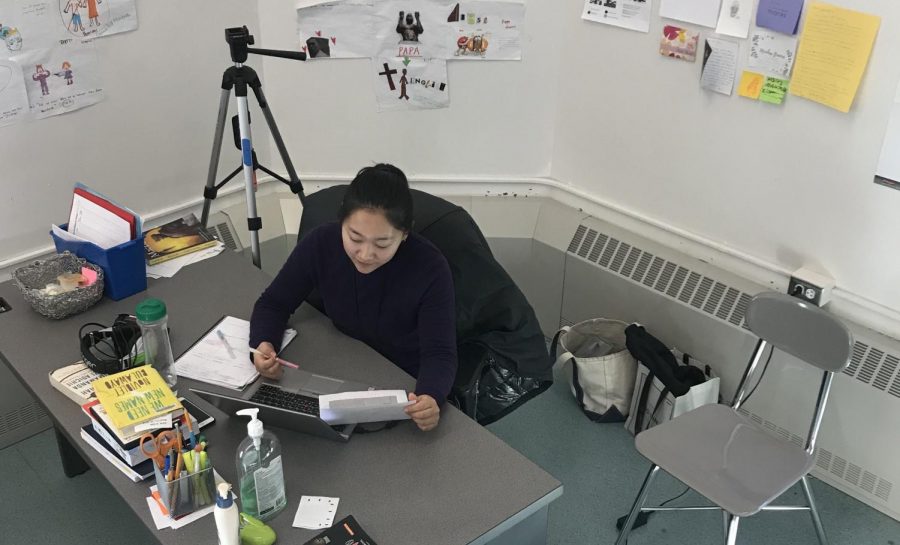College Application Mania
Students Scramble to Meet Deadlines
Pictured: A 10th grade English teacher writing a recommendation letter.
November 30, 2019
The scary, anxiety-producing early application deadline of November 1st has passed, and seniors are now hopefully feeling relieved, with only a few hints of doubt, and worry until it starts all over again for regular applications. Seniors who have gone through the process, have offered some advice on getting recommendation letters from teachers and ideas for improving the support in English classes for writing college application essays.
Asking as early as May of Junior year for recommendation letters seems to be the safest course of action. David Spitz ’20 says you “should ask for them asap [in May].” As for teachers, Claudia Dyer ’20 suggests they should “announce when they’ve reached their cap” for writing college recommendation letters. Gracie Thompson ’20 advises teachers to “be honest with students if you feel like you can’t write a good recommendation.” Hopefully every student can always find at least one teacher who can write an honest and genuine recommendation for them.
A college essay calls for a very different style of writing than anything students have experienced in all their years of middle school and high school. Most have not practiced their skills at creative narrative writing. Eleventh grade English is the only required course offering college-essay writing practice. According to Spitz, “the unit on college essays was helpful for understanding the narrative-reflection format and getting good feedback on your writing.” Similarly, Fanny Lodge ’20 benefited from her experience in English class: “Junior year we wrote our common app essay for an assignment in English class. I didn’t end up using it but I think it was a good exercise. It prepared students for what was coming.” Although the English curriculum was beneficial to some, not all students are guaranteed such a rewarding experience. Many seniors mentioned how useful it is really depends on the teacher you have.
Thompson describes one of the most important things for students to keep in mind: “I felt prepared because I didn’t feel like [the college essays] were the only thing that could represent me well.” It is too easy to magnify the significance, stress, and pressure of application-related assignments, and therefore it’s important to put things into perspective every once in a while.
Students also pointed out how one of the most unique aspects of CRLS, the block system, seems to set some students back. Dyer notes, “I think the block system makes it hard to prepare kids because not everyone has English close to when they’re applying. Maybe if there was a way to read sample essays or supplements from a student who got into X college, students would find it helpful.” Thompson believes the school must provide many more resources for the varied backgrounds of students. She explains that “the school needs to cater to the fact that many kids need assistance with their applications, especially if their families haven’t gone through the process before.”
This piece also appears in our November 2019 print edition.









